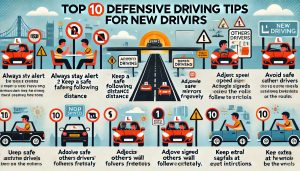 Top 10 Defensive Driving Tips for New Drivers
Top 10 Defensive Driving Tips for New Drivers
Driving for the first time on your own is exciting, but it also comes with new responsibilities. One of the most important skills you can develop as a new driver is defensive driving — the ability to anticipate potential hazards and stay safe on the road, no matter what other drivers do.
Here are the top 10 defensive driving tips every new driver should know.
1. Always Keep a Safe Following Distance
The two-second rule (or more in wet/icy conditions) gives you enough time to react if the car in front suddenly brakes. Tailgating is one of the quickest ways to cause an accident.
2. Stay Alert and Avoid Distractions
Keep your eyes on the road and your hands on the wheel. Phones, loud music, or even chatting with passengers can take your attention away at crucial moments, listen to your driving instructor.
3. Anticipate Other Drivers’ Actions
Never assume other drivers will act predictably. Watch for signs such as sudden lane changes, hesitation at junctions, or speeding, and be prepared to respond safely.
4. Use Your Mirrors Regularly
Checking your mirrors frequently helps you stay aware of what’s happening behind and beside you. This awareness is crucial for overtaking, changing lanes, or slowing down.
5. Adjust Your Speed for Conditions
Defensive driving means adapting to the road, not just sticking to the limit. Slow down in rain, fog, or heavy traffic to maintain control and visibility.
6. Don’t Drive in Blind Spots
Avoid lingering in other drivers’ blind spots, especially lorries and larger vehicles. Likewise, check your own blind spots before changing lanes.
7. Expect the Unexpected at Junctions
Even if you have right of way, always slow down and look both ways. Defensive drivers assume others may run a red light or fail to give way.
8. Keep Both Hands on the Wheel
This gives you maximum control if you need to swerve or brake suddenly. Casual one-handed driving reduces your reaction time.
9. Stay Calm in Traffic
Road rage and frustration lead to poor decisions. If someone cuts you off or drives aggressively, keep calm, maintain your distance, and avoid confrontation.
10. Plan Ahead and Don’t Rush
Defensive driving is about preparation. Plan your route, leave extra time for delays, and avoid last-minute lane changes or sudden braking.
Checkout TFL Gov website for more information.
